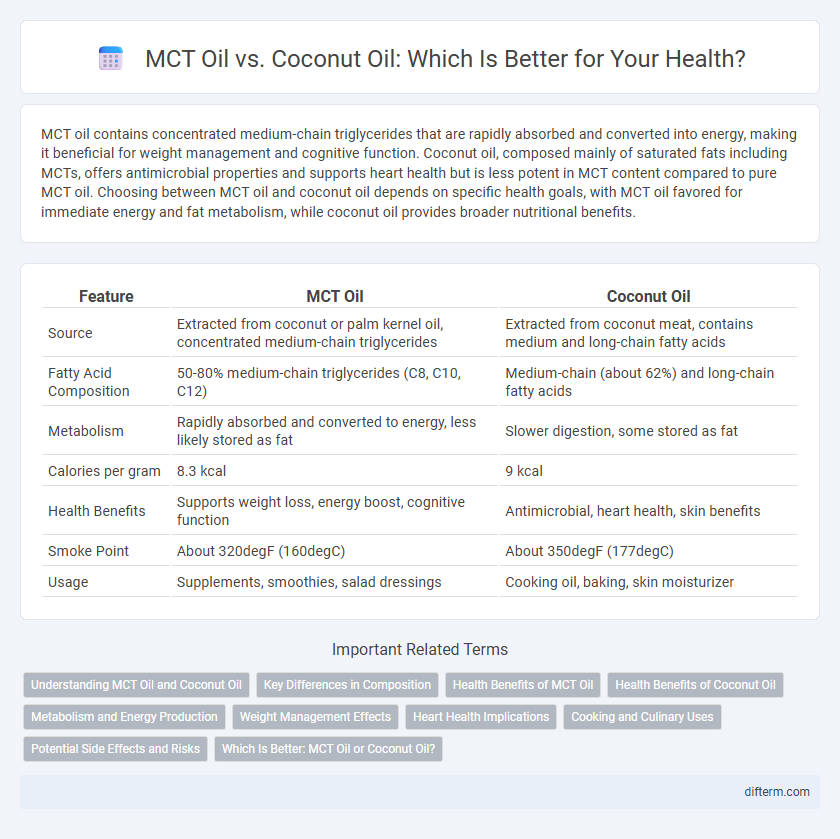MCT oil contains concentrated medium-chain triglycerides that are rapidly absorbed and converted into energy, making it beneficial for weight management and cognitive function. Coconut oil, composed mainly of saturated fats including MCTs, offers antimicrobial properties and supports heart health but is less potent in MCT content compared to pure MCT oil. Choosing between MCT oil and coconut oil depends on specific health goals, with MCT oil favored for immediate energy and fat metabolism, while coconut oil provides broader nutritional benefits.
Table of Comparison
| Feature | MCT Oil | Coconut Oil |
|---|---|---|
| Source | Extracted from coconut or palm kernel oil, concentrated medium-chain triglycerides | Extracted from coconut meat, contains medium and long-chain fatty acids |
| Fatty Acid Composition | 50-80% medium-chain triglycerides (C8, C10, C12) | Medium-chain (about 62%) and long-chain fatty acids |
| Metabolism | Rapidly absorbed and converted to energy, less likely stored as fat | Slower digestion, some stored as fat |
| Calories per gram | 8.3 kcal | 9 kcal |
| Health Benefits | Supports weight loss, energy boost, cognitive function | Antimicrobial, heart health, skin benefits |
| Smoke Point | About 320degF (160degC) | About 350degF (177degC) |
| Usage | Supplements, smoothies, salad dressings | Cooking oil, baking, skin moisturizer |
Understanding MCT Oil and Coconut Oil
MCT oil is a concentrated supplement derived primarily from coconut oil, containing medium-chain triglycerides that are rapidly absorbed and metabolized for quick energy. Coconut oil consists of a broader mix of fatty acids, including a significant proportion of lauric acid, which has antimicrobial properties but is metabolized more slowly than pure MCTs. Understanding their differences helps optimize dietary choices for energy, weight management, and metabolic health.
Key Differences in Composition
MCT oil primarily contains medium-chain triglycerides like caprylic acid (C8) and capric acid (C10), which are rapidly absorbed and metabolized for energy, whereas coconut oil includes a broader range of fatty acids, including lauric acid (C12), a longer chain fatty acid with different metabolic effects. The concentration of MCTs in MCT oil usually exceeds 50-70%, while coconut oil generally contains about 13-15% MCTs. These compositional differences influence their impact on metabolism, energy utilization, and potential health benefits.
Health Benefits of MCT Oil
MCT oil, derived from medium-chain triglycerides, offers rapid energy absorption and supports weight management by promoting fat oxidation and enhancing metabolism. It improves cognitive function by providing ketones as an efficient brain fuel, which may benefit individuals with neurodegenerative conditions. Unlike coconut oil, MCT oil contains a higher concentration of pure medium-chain fatty acids, maximizing its health benefits such as improved digestion and antimicrobial properties.
Health Benefits of Coconut Oil
Coconut oil contains medium-chain triglycerides (MCTs) that can support metabolism and provide a quick source of energy. Rich in lauric acid, coconut oil has antimicrobial properties that may promote immune health and skin healing. Studies suggest coconut oil might improve cholesterol levels by increasing HDL (good cholesterol), contributing to cardiovascular wellness.
Metabolism and Energy Production
MCT oil contains medium-chain triglycerides that are rapidly absorbed and converted into ketones, providing a quick source of energy and boosting metabolism more efficiently than coconut oil. Coconut oil contains a mix of fats, including longer-chain triglycerides that require more digestion time, leading to slower energy release. Studies suggest MCT oil enhances thermogenesis and fat oxidation, supporting improved metabolic rate and sustained energy production.
Weight Management Effects
MCT oil is rapidly metabolized by the liver, promoting increased energy expenditure and fat oxidation, which may enhance weight loss compared to coconut oil. Coconut oil contains a mix of medium and long-chain triglycerides, resulting in slower metabolism and less pronounced effects on appetite suppression and fat burning. Studies indicate that MCT oil intake can lead to greater reductions in body weight, waist circumference, and fat mass than coconut oil within controlled dietary interventions.
Heart Health Implications
MCT oil, composed primarily of medium-chain triglycerides, is rapidly metabolized for energy and may support improved lipid profiles by increasing HDL cholesterol and reducing LDL cholesterol, promoting heart health. In contrast, coconut oil contains a higher proportion of saturated fats, such as lauric acid, which can raise total cholesterol levels and potentially increase cardiovascular risk if consumed excessively. Studies suggest MCT oil has a more favorable impact on heart health biomarkers compared to coconut oil, making it a preferable choice for cardiovascular support.
Cooking and Culinary Uses
MCT oil and coconut oil differ significantly in cooking and culinary applications due to their fat composition and smoke points. MCT oil, rich in medium-chain triglycerides, has a low smoke point around 320degF (160degC), making it unsuitable for high-heat cooking but ideal for salad dressings and smoothies. Coconut oil contains a higher saturated fat content with a smoke point of 350degF (177degC) for unrefined and 450degF (232degC) for refined versions, allowing more versatility for sauteing, baking, and frying.
Potential Side Effects and Risks
MCT oil may cause digestive issues such as diarrhea, nausea, and stomach cramps when consumed in excess, while coconut oil's high saturated fat content raises concerns over increased LDL cholesterol and heart disease risk. Individuals with liver conditions should exercise caution with MCT oil due to its rapid metabolism, which can strain the liver. Both oils can trigger allergic reactions in sensitive individuals, highlighting the importance of moderation and consultation with healthcare professionals before incorporating them into a health regimen.
Which Is Better: MCT Oil or Coconut Oil?
MCT oil contains a higher concentration of medium-chain triglycerides, which are rapidly metabolized by the liver for quick energy and may aid in weight management and cognitive function. Coconut oil, while rich in MCTs, also contains long-chain fatty acids and less pure MCT content, making it less efficient for immediate energy use but beneficial for overall heart health due to its antioxidant properties. For targeted health benefits like improved metabolism and brain health, MCT oil is generally considered superior to coconut oil.
MCT oil vs coconut oil Infographic

 difterm.com
difterm.com